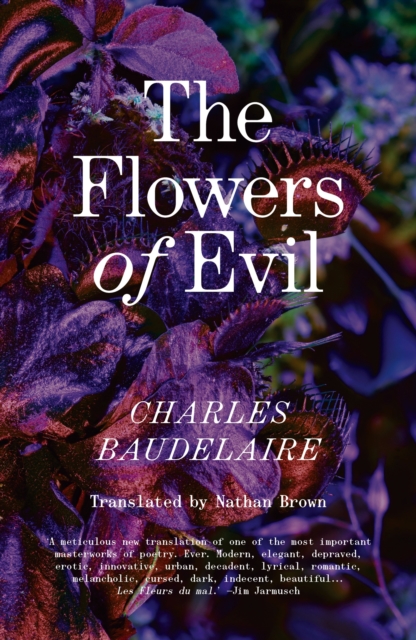The Flowers of Evil : The Definitive English Language Edition
Probing the depths of the modern psyche in a voice at once caustic and vulnerable, melancholic and humorous, Baudelaire's infamous book brings to the surface a new understanding of evil, of eroticism, and of social life through an astonishing variety of poetic forms and styles.
This edition adds the poems banned from the original 1857 publication to the expanded collection of 1861 and includes an introduction from the translator, acclaimed poetry scholar Nathan Brown.
Product Information
- Author: Charles Baudelaire
- Language: Angļu valoda
- Year of publication: 2024
- Manufacturer: Verso Books
- Cover type: Soft cover
- Number of pages: 480
- product.Svars: 0.368 kg
- ISBN code: 9781804296608
This item is out of stock
Leave your e-mail and you will receive a message as soon as it is available again!

Attention: Delivery of sale books may be delayed!

Discount on full price items. Discounts cannot be combined!

Orders are processed on weekdays from 10:00 to 18:00.

Free delivery to OMNIVA parcel machines in Latvia for orders over €40.00.

Free delivery to any GLOBUSS bookstore within 2-5 working days.
Share on social networks:
Product description
MEDIA REVIEWS
The unfailing vision of Baudelaire who trumpeted the space and light of the future. - Patti Smith
A meticulous new translation of one of the most important masterworks of poetry. Ever. Modern, elegant, depraved, erotic, innovative, urban, decadent, lyrical, romantic, melancholic, cursed, dark, indecent, beautiful...Les Fleurs du mal. - Jim Jarmusch
All the true, modern, poetic colours, remember Baudelaire was the first to find them. - Marcel Proust
Baudelaire is indeed the greatest exemplar in modern poetry in any language. - T.S. Eliot
I have, over the years, seen and taught many translations of Les Fleurs du Mal, some by celebrated poets, some by leading scholars, but to my eye and ear, Nathan Brown's is the most successful. Here is a superb translation of one of the great poetic works of modernism. - Marjorie Perloff, author of The Poetics of Indeterminacy: Rimbaud to Cage
I've never been able to read any translations of Baudelaire except the plain prose versions in Francis Scarfe: the verse always sounded too lofty in English. But Nathan Brown somehow manages to stay true to Les Fleurs du mal's darkness and cheap thrills-and to what old Eric Auerbach called its essential 'aesthetic dignity'. - T.J. Clark, author of If These Apples Should Fall: Cézanne and the Present
Fleurs du mal is full of beauty and riddles which are notoriously difficult to render in English. I'm so grateful that Nathan Brown, a scholar of such rigor and sensitivity, has taken the plunge and translated this ever-living masterpiece, and by a novel and much-needed approach: with nimble fidelity to the line, with a commitment to "hear" the poem and be out of its way, to let Baudelaire speak to us, as directly as he can, through the prism of a new mind. - Rachel Kushner, author of The Flamethrowers
Nathan Brown's exceptional new translation of Baudelaire's Les Fleurs du mal not only deftly avoids many of the common pitfalls of other translations, it offers a welcome corrective to them. Brown's translations are elegant, precise, sparse, and accurate. They brilliantly succeed in conveying Baudelaire's startling, audacious, and inimitable poetic voice. - Elissa Marder, author of Dead Time: Temporal Disorders in the Wake of Modernity
Nathan Brown's careful, restrained translation of Les Fleurs de mal accomplishes what no English edition of Baudelaire has quite achieved: a balance of formal precision and readability, with a respect for the inherent mystery and complexity of these poems. This skillful edition sets a new standard. - Ronjaunee Chatterjee, author of Feminine Singularity: The Politics of Subjectivity in Nineteenth Century Literature
Some poems, like Baudelaire's 'The Eyes of the Poor,' impressed me so much that I wanted to make a song of them. Their style, for me, already has a kind of musical rhythm. Singing 'How Beautiful You Are' is like going into oral tradition. I take more pleasure expressing love in this Baudelaire poem than singing 'Friday I'm in Love. - Robert Smith, The Cure
I like Shakespeare, but I also like Joe Brainard. I like Rilke, but I also like Bill Knott. Probably in terms of affinity, the richest body of work for me would be Baudelaire. You can tell I'm talking about personal affinity, where I always go back and get the most stimulation from Baudelaire. - Richard Hell


.jpg)
.jpg)
.jpg)
.jpg)
.jpg)
.jpg)
.jpg)
.jpg)